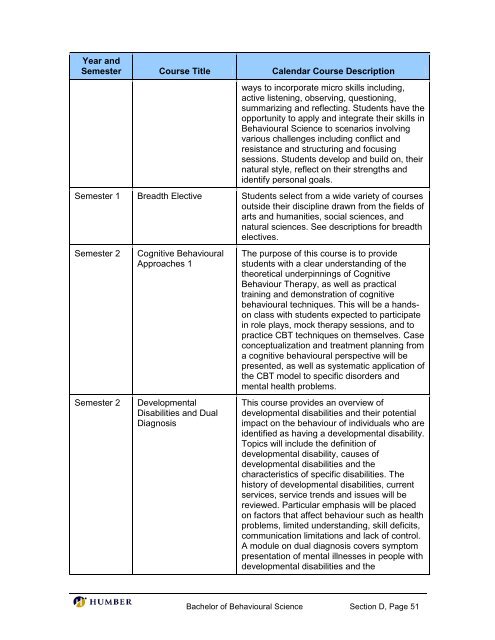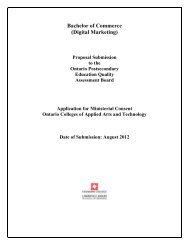Bachelor of Behavioural Science - Postsecondary Education Quality ...
Bachelor of Behavioural Science - Postsecondary Education Quality ...
Bachelor of Behavioural Science - Postsecondary Education Quality ...
You also want an ePaper? Increase the reach of your titles
YUMPU automatically turns print PDFs into web optimized ePapers that Google loves.
Year and<br />
Semester Course Title Calendar Course Description<br />
ways to incorporate micro skills including,<br />
active listening, observing, questioning,<br />
summarizing and reflecting. Students have the<br />
opportunity to apply and integrate their skills in<br />
<strong>Behavioural</strong> <strong>Science</strong> to scenarios involving<br />
various challenges including conflict and<br />
resistance and structuring and focusing<br />
sessions. Students develop and build on, their<br />
natural style, reflect on their strengths and<br />
identify personal goals.<br />
Semester 1 Breadth Elective Students select from a wide variety <strong>of</strong> courses<br />
outside their discipline drawn from the fields <strong>of</strong><br />
arts and humanities, social sciences, and<br />
natural sciences. See descriptions for breadth<br />
electives.<br />
Semester 2<br />
Semester 2<br />
Cognitive <strong>Behavioural</strong><br />
Approaches 1<br />
Developmental<br />
Disabilities and Dual<br />
Diagnosis<br />
The purpose <strong>of</strong> this course is to provide<br />
students with a clear understanding <strong>of</strong> the<br />
theoretical underpinnings <strong>of</strong> Cognitive<br />
Behaviour Therapy, as well as practical<br />
training and demonstration <strong>of</strong> cognitive<br />
behavioural techniques. This will be a handson<br />
class with students expected to participate<br />
in role plays, mock therapy sessions, and to<br />
practice CBT techniques on themselves. Case<br />
conceptualization and treatment planning from<br />
a cognitive behavioural perspective will be<br />
presented, as well as systematic application <strong>of</strong><br />
the CBT model to specific disorders and<br />
mental health problems.<br />
This course provides an overview <strong>of</strong><br />
developmental disabilities and their potential<br />
impact on the behaviour <strong>of</strong> individuals who are<br />
identified as having a developmental disability.<br />
Topics will include the definition <strong>of</strong><br />
developmental disability, causes <strong>of</strong><br />
developmental disabilities and the<br />
characteristics <strong>of</strong> specific disabilities. The<br />
history <strong>of</strong> developmental disabilities, current<br />
services, service trends and issues will be<br />
reviewed. Particular emphasis will be placed<br />
on factors that affect behaviour such as health<br />
problems, limited understanding, skill deficits,<br />
communication limitations and lack <strong>of</strong> control.<br />
A module on dual diagnosis covers symptom<br />
presentation <strong>of</strong> mental illnesses in people with<br />
developmental disabilities and the<br />
<strong>Bachelor</strong> <strong>of</strong> <strong>Behavioural</strong> <strong>Science</strong> Section D, Page 51
















